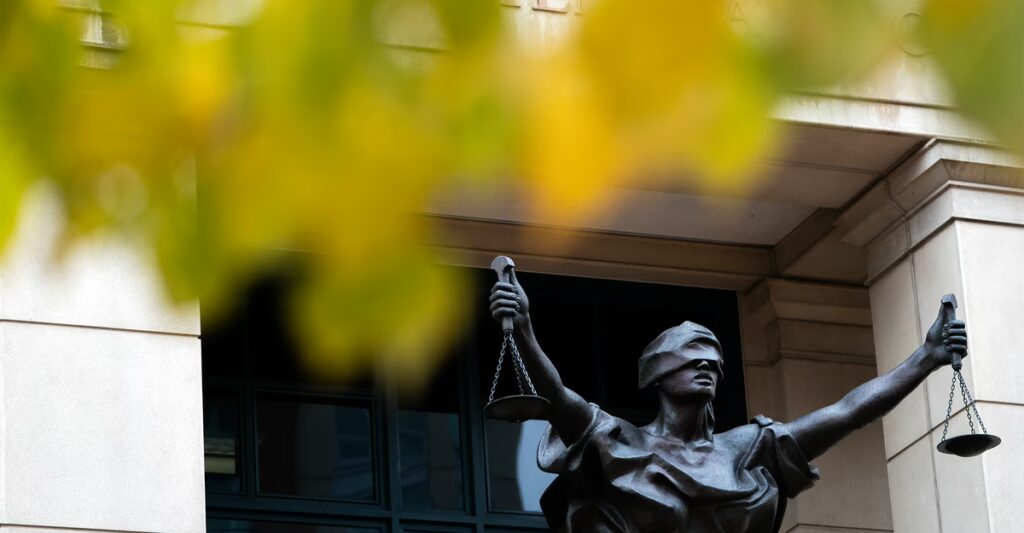President Donald Trump may be stretching executive power to its outermost bounds, but in one very significant area he is simply not getting his way: criminal prosecutions. In many cases—such as those of former FBI Director James Comey and New York Attorney General Letitia James, charges against whom were thrown out by a federal judge in Virginia today—the basic, ground-level machinery of the criminal-justice system has thwarted the administration.
In areas such as immigration and administrative law, too many supposed checks on Trump’s power have proved inadequate to the task. He governs by executive fiat, enabled by a passive Republican Congress and compliant Supreme Court majority. But the constitutional and procedural protections of the criminal-justice system, designed to safeguard individual liberty from the power of the federal government, are unique and largely immune to his decrees.
Trump can accuse his enemies of crimes on social media, and millions of his followers will believe it. He can place his allies in powerful positions in the Justice Department. They can talk tough and launch investigations and obtain indictments—or, failing that, at least file misdemeanor charges.
But once in the courtroom, bluster and name-calling don’t cut it. Facts and evidence still matter. Laws and procedures must be understood and followed. Independent trial judges, skilled defense counsel, and the Bill of Rights’ protections for defendants all come into play.
The adversary system is an exceptionally effective means of finding the truth. In Comey’s case, it is exposing a flawed, corrupt prosecution for what it is. In others, overzealous prosecutions are giving local citizens on juries and grand juries an opportunity to push back on Trump’s takeover of their cities. The basic safeguards of the criminal-justice system are proving to be some of the most effective checks on Trump’s power.
At least as far back as the “Lock her up” chants of his first presidential campaign, Trump has seemingly had no qualms about turning the criminal-justice system against his opponents. He regularly and openly demands that his political adversaries be prosecuted. During his first administration, the Justice Department’s leaders pushed back against Trump’s worst impulses. This time, though, from Attorney General Pam Bondi on down, he has filled the department’s ranks with loyalists and former personal attorneys who are more than willing to follow his commands.
But the Justice Department is only one of the cogs in the slow-grinding wheels of justice. And in case after case, the other cogs—notably judges as well as grand juries and trial juries—have proved admirably immune to Trump’s abuses. Trump is discovering that although it’s easy to convict people in a social-media rant, inside the courtroom things are a bit more complicated.
Consider the prosecution of James Comey. Trump has railed against Comey for years, angry about Comey’s role in what Trump absurdly calls the “Russia hoax.” Recently he publicly demanded that Bondi prosecute Comey and several other of Trump’s perceived enemies, declaring that they are “guilty as hell.”
When the career U.S. attorney in Virginia declined to bring the case, Trump forced him out and replaced him with Lindsey Halligan, one of the president’s former personal attorneys with no experience as a prosecutor. A few days later, and a few days before the statute of limitations would have expired, Halligan, acting alone, indicted Comey for allegedly lying to Congress.
The day of the indictment was probably the high-water mark of the Comey prosecution, which almost immediately began to fall apart. Court hearings revealed what one judge called “a disturbing pattern of profound investigative missteps” that jeopardize the case. Halligan allegedly misled the grand jury on fundamental legal principles and failed to obtain the full grand jury’s vote on the final indictment. The defense also has made a compelling case for dismissal based on vindictive prosecution. Even if today’s dismissal—on the grounds that Halligan was illegally appointed to her position—doesn’t stand on appeal, this prosecution seems doomed, and rightly so.
Take, as another example, the case of Sean Dunn, a.k.a. “Sandwich Guy.” Dunn was prosecuted for assaulting a federal officer after hurling a Subway sandwich, with a side of assorted expletives, at a Customs and Border Patrol agent. Dunn was protesting the agent’s presence as part of Trump’s federal law-enforcement surge in D.C. this past summer.
You’re not supposed to throw things at law-enforcement officers, no matter how strongly you object to their presence. I think Dunn deserved some kind of punishment. When I was in the D.C. U.S. Attorney’s Office, a case like this might have resulted in a minor misdemeanor charge in the local court, if it was charged at all. Or sometimes noncriminal consequences for bad behavior are enough; for example, Dunn lost his job as a Justice Department paralegal because of the incident.
But the U.S. attorney for D.C., the former Fox News host Jeanine Pirro, wanted to look tough and demonstrate she would come down hard on any dissent to the federal occupation of the district. She charged Dunn in federal court with a felony punishable by up to eight years in prison and released a swaggering social-media video boasting about the charge. This was wildly excessive, demonstrating none of the reasonable charging discretion (not to mention professional decorum) the public should expect from federal prosecutors.
Then the unexpected happened: The grand jury refused to return a felony indictment.
The rarity of a grand jury returning a “no true bill”—a rejection of a proposed indictment—is hard to overstate. In my 12 years as a federal prosecutor, I never had it happen. The probable-cause standard is low, the grand jury hears only the government’s side of the case, and the vote need not be unanimous. If a prosecutor decides to seek an indictment, the grand jury almost always agrees.
But for this Justice Department, no true bills have become a relatively regular occurrence. In both D.C. and Los Angeles, grand juries have been rejecting felony charges against those protesting the presence of federal troops in their cities. This humiliating pattern should be sending a message, if anyone in the Justice Department were willing to listen.
In the case of Sandwich Guy, Pirro had to settle for a federal misdemeanor charge—which does not require the grand jury’s approval. Early this month, Dunn went on trial in a D.C. federal courtroom. Dunn admitted striking the officer with the sandwich. The entire incident had been captured on a video that had gone viral. In short, there was no doubt that he did it. Even so, the jury found him not guilty.
It was just one little case, involving one defendant, in one city. And as a former federal prosecutor, I’ve never been a big fan of jury nullification, where a jury refuses to convict based on factors outside the law and evidence. But the verdict symbolized something much more significant: the limits of Trump’s reach when it comes to criminal justice.
Dunn’s is not the only case in which a trial jury has stood in Trump’s way. In a similar case, another D.C. jury found a woman by the name of Sidney Reid not guilty of misdemeanor assault on a federal officer after her minor scuffle with an officer during a protest resulted in some scratches on the officer’s hand. (Pirro’s office had originally tried to charge Reid with a felony as well, and the grand jury rejected the charge—three times.)
Grand juries and trial juries are made up of local citizens who represent the voice of the community—in many of these cases, communities fed up with Trump’s deployment of federal troops in their neighborhood. In response to the overreach of Trump’s Justice Department, they are saying, “enough.” This check from American citizens is something Trump cannot control. And once a jury finds a defendant not guilty, the government has no right to appeal. A person cannot be retried.
This is not to say that all is rosy when it comes to the rule of law in the criminal-justice system—far from it. Simply being indicted results in tremendous emotional, financial, and reputational harm, even if a case ultimately gets tossed out. Trump’s other abuses of the justice system, such as his unprincipled use of the pardon power, remain unchecked. And the power not to pursue an investigation at all, as in the case of Tom Homan, Trump’s so-called border czar, accepting $50,000 in cash in an apparent bribery attempt, allows the Trump administration to protect friends and allies by ignoring their potential crimes. The destruction of the Department of Justice’s independence and fairness has been very real, and will take generations to repair.
But don’t lose sight of what is still working as it should. The resilience of the criminal-justice system serves as an encouraging reminder that there are restrictions on executive power built into our constitutional system that are beyond Trump’s reach.
In a statement following his indictment, Comey said: “My heart is broken for the Department of Justice, but I have great confidence in the federal judicial system.” That’s exactly how I and many of his other former DOJ colleagues feel. That confidence is proving to be well founded.
The post The One Place Trump’s Power Remains Constrained appeared first on The Atlantic.




